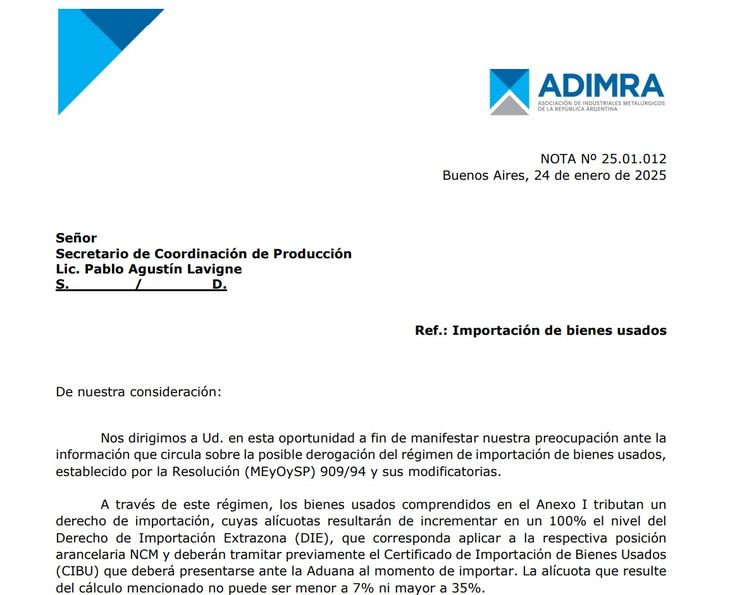The government analyzes the importation of used capital goods. Thus, industry sources that showed concern about the impact of the possible measure were confirmed to the scope. This media could access a note that the Association of Metallurgical Industrialists of the Argentine Republic (Adimra) sent to the Secretary of Commerce Pablo Lavigne to express your concern about the possible repeal of the current regime. They ensure that it discourages investment in technology and generates quality risks. Agricultural machinery, Oil & Gas and medical equipment, the sectors that would be most affected.
It is not just preaching. President Javier Milei advances on his agenda for deregulation of the economy and commercial openness. Licensing, tariffs, dismantling quality standards and changes in the anti -dumping system, are some of the measures already taken in that regard.
But there is more. Industrialists anticipate that the next deregulation will be aimed at promoting the importation of used capital goods. They learned of journalistic transcenders and also by exchanges with officials of the economic team, according to sources from the sector to this media.
How is the entry of used machines regulated?
Given this situation, the Association of Metallurgical Industrialists of the Argentine Republic (Adimra) sent a note to the Secretary of Commerce Pablo Lavigne in which he expresses his concern about the potential measure and asks for an audience with the official who responds to the Minister of Economy Luis Caputo.
The current regime is regulated by resolution 909 and its modifications dates from the 90s and regulates the entry of goods used in three annexes. In the first are the goods that pay an import right and require processing an import certificate to analyze the affectation to the local industry.
Whatsapp image 2025-01-27 at 09.27.32.jpeg
In the second Annex, the tariff positions are found whose income is prohibited. Among them machinery for the agricultural, energy, health, construction and transport sector. For the goods of the third annex, the income is direct, in that condition there is broad and varied amount of tariff positions.
Over time, the regime was updated according to changes in the market and the different goods were going from one annex to the other. Industrialists are not against promoting modifications. What they do not want is that the regime ceases to exist and that the entry of any used machine is made directly. as the Secretary of Transformation of the State Maximiliano Fariña hinted.
THE LETTER OF THE INDUSTRIALS TO Lavigne
The note sent by the camera that brings together the metallurgical to Lavigne expresses “concern about the information that circulates about the possible repeal of the import regime of used goods”. In that sense, he warns that “the repeal of this regime would affect national production and employment because it generates unfair competition between a new and one used.”
WhatsApp Image 2025-01-27 at 09.24.45.jpeg

Several doubts arise on this last point: how is it made to value a good capital good? In what conditions does it come? The taxes about which value pays them? Can any value be declared?
The text highlights that “in the current consultation regime for the processing of the CIB, at the time of responding to the cases in which there is national production, the manufacturer’s data, the productive capacity and the deadline for the delivery of the good are reported.” In turnhe points out that the deregulation of this segment “entails safety risks for the state of the goods.”
The repeal of the regulations would come during an accelerated process of exchange appreciation which puts the Argentine economy as a whole in a less competitive position and in the midst of a crisis that produced two -digit falls in the vast majority of industrial sectors.
Source: Ambito




